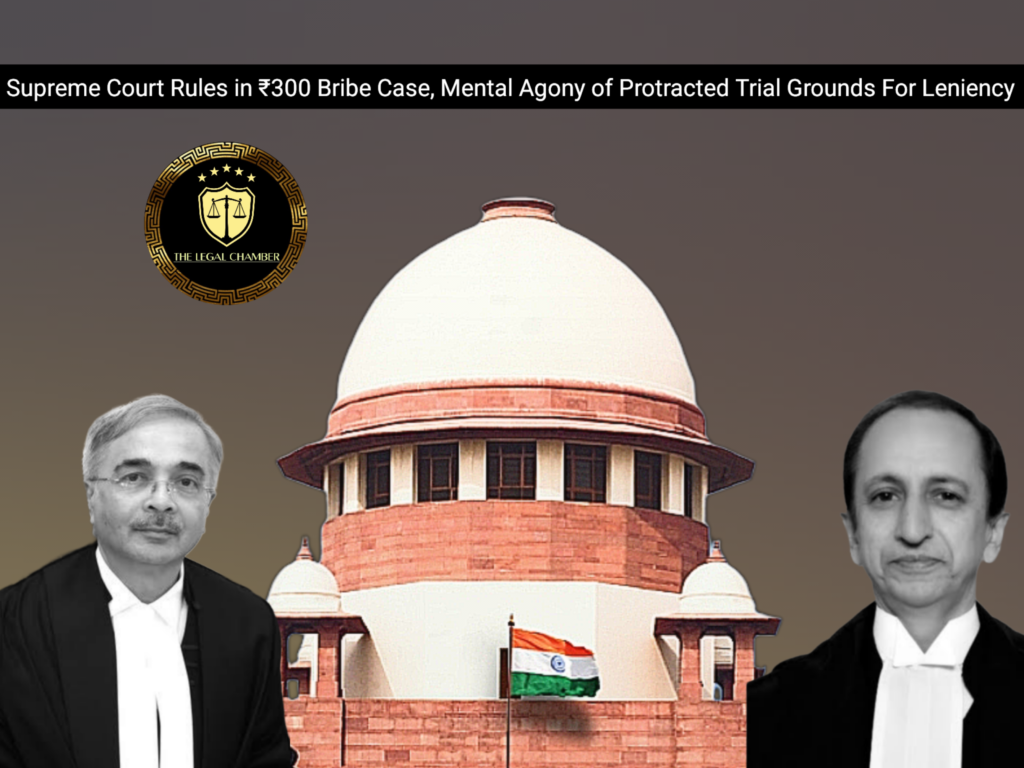
The Supreme Court upheld the conviction under the Prevention of Corruption Act, 1988. However, applying reformative sentencing principles, it reduced the substantive sentence to the period already undergone due to a 23-year delay and mitigating circumstances. The fine was significantly enhanced to balance the interests of justice.
Facts Of The Case:
The appellant, K. Pounammal, was an Inspector of Central Excise. The complainant, a supervisor at a match factory, had applied for a fresh central excise registration certificate, which was to be processed within the appellant’s jurisdiction. The prosecution’s case was that on September 16, 2002, the appellant demanded an illegal gratification of ₹300 from the complainant, threatening to delay the certificate if the amount was not paid. The complainant did not pay the bribe and subsequently filed a complaint on September 21, 2002. After obtaining the necessary sanction, a charge sheet was filed. The trial court, and later the High Court, convicted the appellant under Sections 7 and 13(2) read with 13(1)(d) of the Prevention of Corruption Act, 1988. The courts concurrently held that the demand and acceptance of the bribe were proven, relying on witness testimonies and evidence, including a positive phenolphthalein sodium carbonate test on the appellant’s hands. The appellant ultimately conceded to the conviction before the Supreme Court, confining her appeal solely to the question of the sentence imposed.
Procedural History:
The procedural history of the case began with the filing of a complaint on September 21, 2002, leading to an investigation and the granting of sanction to prosecute by the Competent Authority on March 26, 2003. A charge sheet was filed on May 7, 2003, before the Special Judge for CBI in Madurai. The trial concluded on November 5, 2003, with the Special Judge convicting the appellant and sentencing her to rigorous imprisonment. This conviction and sentence were subsequently challenged before the Madras High Court, which, in its judgment dated August 4, 2010, confirmed the trial court’s decision. The appellant then filed the present appeal before the Supreme Court, which, in its judgment dated August 21, 2025, upheld the conviction but modified the sentence.
READ ALSO :Supreme Court Denies Specific Performance Over Tainted Agreement: Readiness to Pay Not Enough
Court Observation:
The Supreme Court made significant observations on the principles of sentencing, particularly in cases involving long delays. The Court noted that while the conviction under the Prevention of Corruption Act, 1988 was firmly based on evidence proving demand and acceptance of bribe, the question of sentence required a separate consideration. It emphasized that a prolonged criminal trial, spanning over 22 years in this instance, itself constitutes a form of mental agony and incarceration for the accused. The Court applied a reformative approach, considering mitigating circumstances such as the appellant’s advanced age (75 years), her status as a widow living alone, the meager bribe amount (₹300), and the fact that she had already undergone 31 days of imprisonment. Balancing these factors with the need for deterrence, the Court held that the period already undergone was an adequate substantive sentence, but enhanced the fine to ₹25,000 to signify the seriousness of the offense.
Final Decision & Judgement:
The Supreme Court dismissed the appeal by upholding the appellant’s conviction under Sections 7 and 13(2) read with Section 13(1)(d) of the Prevention of Corruption Act, 1988. However, the Court modified the sentence. The substantive sentence of imprisonment was reduced to the period already undergone, which was 31 days, considering the 23-year delay in the conclusion of proceedings and the appellant’s mitigating circumstances, including her advanced age of 75 years. To balance this leniency and uphold the deterrent aspect of the law, the Court significantly enhanced the fine from the original ₹1,000 to ₹25,000, to be paid by September 10, 2025. The Court stipulated that failure to pay the enhanced fine would result in the revival of the original sentence.
Case Details:
Case Title: K. Pounammal vs. State Represented by Inspector of Police Citation: 2025 INSC 1014 Criminal Appeal No.: Criminal Appeal No. 1716 of 2011 Date of Judgement: August 21, 2025 Judges/Justice Name: Justice N.V. Anjaria and Justice Atul S. Chandurkar
Download The Judgement Here